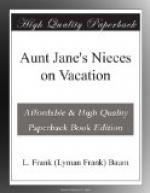“Perhaps,” suggested Louise, “he had been insane and escaped from some asylum.”
“Then how did he come to be lying in a ditch?” questioned Patsy; “and wouldn’t an escaped maniac be promptly hunted down and captured?”
“I think so,” agreed Mr. Merrick. “For my part, I’m inclined to accept the man’s theory that it was an automobile accident.”
“Then what became of the car, or of the others in it?”
“It’s no use,” said Beth, shaking her head gravely. “If Thursday Smith, who is an intelligent young man, couldn’t solve the mystery himself, it isn’t likely we can do so.”
“We know as much as he does, as far as that is concerned,” said Patsy, “and our combined intelligence ought at least to equal his. I’m sorry for the poor man, and wish we might help him to come to his own again.”
They all agreed to this sentiment and while the girls attended to their editorial duties they had the amazing story of Thursday Smith uppermost in their minds. When the last copy had been placed in the hands of Miss Briggs and they were driving to the farm—at a little after six o’clock—they renewed the interesting discussion.
Just before reaching the farm Hetty Hewitt came out of the wood just in front of them. She was clothed in her short skirt and leggings and bore a fishing rod and a creel.
“What luck?” asked Patsy, stopping the horse.
“Seven trout,” answered the artist. “I might have caught more, but the poor little creatures squirmed and struggled so desperately that I hadn’t the heart to destroy any more of them. Won’t you take them home for Mr. Merrick’s breakfast?”
Patsy looked at the girl musingly.
“Jump in, Hetty,” she said; “I’m going to take you with us for the night. The day’s fishing has tired you; there are deep circles under your eyes; and that stuffy old hotel isn’t home-like. Jump in.”
Hetty flushed with pleasure, but hesitated to accept the invitation.
“I—I’m not dressed for—”
“You’re all right,” said Beth, supporting her cousin’s proposition. “We’ll lend you anything you need.”
“Do come, Miss Hewitt,” added Louise.
Hetty sighed, then smiled and finally climbed into the surrey.
“In New York,” she said, as they started on, “I’ve sometimes hobnobbed with editors; but this is somewhat different.”
“In what way?” asked Patsy casually.
“You’re not real journalists, you know, and—”
“Why aren’t we journalists?” asked Louise.
For a moment Hetty was puzzled how to reply.
“You are doing very good editorial work,” she said mendaciously, “but, after all, you are only playing at journalism. The real journalist—as I know him—is a Bohemian; a font of cleverness running to waste; a reckless, tender-hearted, jolly, careless ne’er-do-well who works like a Trojan and plays like a child. He is very sophisticated at his desk and very artless when he dives into the underworld for rest and recreation. He lives at high tension, scintillates, burns his red fire without discrimination and is shortly extinguished. You are not like that. You can’t even sympathize with that sort of person. But I can, for I’m cut from a remnant of the same cloth.”




